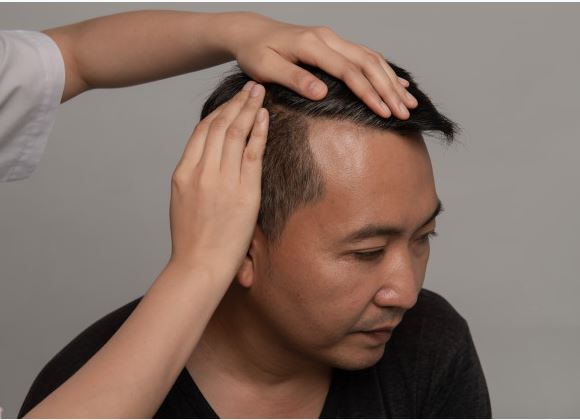Men are no newcomers to the lack of hair. Two-thirds of males in the United States suffer hair loss before the age of 35, according to the American Hair Loss Organization. Roughly 85 percent of American men show visible hair thinning by the age of 50.

Hair loss (alopecia) may either impact the scalp or the whole body and can be acute or irreversible. It may be the product of inheritance, shifts in hormones, medical disorders, or a natural part of aging. Anyone can lose their head’s hair, but in men, it is more likely.
Typically, baldness relates to excessive removal of hair from the head. The most prevalent source of baldness is inherited hair loss with age. Some individuals tend to let the untreated and unhidden hair loss run its course.
Are there any male trait baldness complications?
Many men can understandably feel less good about their looks as they lose hair. This can impact their attitude and well-being at times. Any therapy will help men come to grips with this normal aging phase.
When the skin is not covered by hair, there is a greater danger of sunburn and sun-related skin injury.
In certain instances, the hair will fully recede. Although it is normal and often appropriate to lose hair strands every day, more pronounced levels of shedding can result from aggressive male pattern balding. This may be a symptom of male pattern baldness if you have more than a dozen or so hairs on your pillowcase after waking or more than average amounts of hair in your comb.
Causes:
The question asked by many men is: What causes male pattern baldness? Below are the top reasons that can contribute to hair loss in men.
Food & Diet
While diet typically does not play as large a role as it does for women in male hair loss, nutritional deficiencies may contribute to accidental thinning and shedding. This is especially true when the necessary dietary allowances (RDA) of vitamins and minerals are not fulfilled by men. Iron, zinc, vitamin B, and protein, which are naturally present in many animal products, are the main contributors to hair development.
Supplements and medications
Hair loss, such as that used with cancer, asthma, obesity, cardiac disease, gout, and elevated blood pressure, maybe a side effect of some medications.
Treatments and Hairstyles
A form of hair loss called traction alopecia can cause extreme hairstyling or hairstyles that pull your hair close, such as pigtails or cornrows. Hot-oil hair treatments and irreversible treatments may also contribute to hair falling out. Hair loss may be irreversible if scarring happens.
Old age
The longer your hair is subjected to DHT, the more likely it is that you would notice substantial hair loss. This is the predominant explanation of why when they hit their 40s, 50s, and 60s, male pattern baldness is more prevalent in males.
Stressful Happenings
A major shock to the system will induce hair thinning, whether induced by emotional or physical stress. Surgery or a loss in the family include instances of certain so-called cause cases.
What are the preventions for baldness in males?
For several men, coming to grips with losing one’s hair is challenging. Unfortunately, there are lots of private clinics out there that offer amazing outcomes but don’t always warn you about what can go wrong. Hair replacement therapies are not all very successful and can become very costly easily. Have a few reviews from multiple places before you agree to something.
How to stop that?
Use soft brushes. When brushing and combing, especially when your hair is damp, use a detangler and prevent tugging. A wide-toothed comb could help prevent hair from getting pulled out. Stop painful therapies such as heat rollers, curling irons, and permanent hot-oil treatments.
Although as a consequence of hereditary predisposition, men more frequently undergo hair loss and balding, there are other sources of both acute and permanent shedding. Understanding the root cause of hair loss can mean that the right care for their disease is provided to patients.
Interesting Related Article: “How Are Copper Peptides Proven To Boost Hair Growth?“

